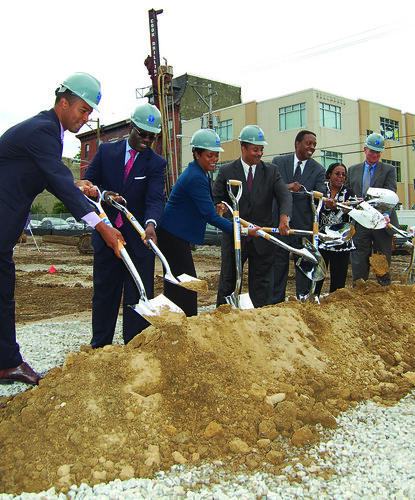Some worry a new complex could isolate international students on campus.
Starting next fall, a four-story Main Campus housing complex will accommodate as many as 200 international students. Construction on the building, located on Cecil B. Moore Avenue between North Sydenham and 16th streets, began last month.
The project marks a partnership between the university and Beech Interplex, a neighborhood development organization that is sponsoring the project. President Ann Weaver Hart said the project will create “jobs, homes and a welcoming place for international students and international scholars.”

Beech President Ken Scott said the 77,000-square-foot complex will contain 108 units, most of which will include two bedrooms and will be priced at approximately $700 a month per person.
Alhough details of the selection process are still tentative, Scott said residents will be international students, students interested in learning about international issues or students from Temple’s international campuses.
Scott said he expects eight of the units to be dedicated to international researchers visiting Temple.
According to a statement released by Beech, the first floor of the complex is set to have “a café, conference space and an international marketplace with flexible space for art, music and a theater.”
Scott sees the project as a good opportunity for the local neighborhood to participate in a cultural exchange, and once the complex is running, he hopes to coordinate trips for some of the local schools, he said.
While Adam Azlan, a senior actuarial science major from Malaysia, said he can see how this housing option will help international students transition to life in the United States, he is unsure that “isolating the international students from the local students” is the best idea.
Azlan, who is also the public relations director for the Malaysian Student Association, is worried the arrangement will “not help [international students] learn about the American culture,” one of the main reasons he chose to study in the U.S., he said.
Adebusayo Adewole, a junior risk management major, echoed Azlan’s concerns.
“When [international students] get here, they’re in a new country. They just want to learn everything,” Adewole said. Adewole, who grew up in New York, has Nigerian parents.
“The [housing] sounds really great, but I’m just worried that it will isolate the international students from us, because they get really comfortable with each other,” he added. “They may not want to mingle with other students.”
Francis Ogdo, a senior criminal justice major and the provost of the Organization of African Students, said he sees things playing out differently.
Right now, Ogdo, a second-generation Nigerian from New Jersey, said he feels “different nationalities have their different spaces [on Main Campus]. It kind of looks segregated, and this will bring them together.”
Azlan said the housing option could benefit international students if the complex accepts applications via mail. Some rental properties and apartment complexes require potential leasees to apply in person, he said, which can present difficulties for international students.
Azlan said he would not consider living at the complex because he feels $700 a month is too expensive.
Regardless of their feelings toward the apartments, both Adewole and Azlan were positive about the cultural opportunities the first floor of the complex will afford the neighborhood.
The project will also provide 200 construction jobs and 50 permanent jobs, which Scott said would ideally be filled by neighborhood residents or Temple students.
Councilman Darrell Clarke said the new jobs are the most significant part of the project, “because employment is one of the most difficult challenges that we face in neighborhoods like this.”
At the project’s groundbreaking, Hart said the complex will be Beech’s “mark on the world.”
Sari Heidenreich can be reached at sarih@temple.edu.



Be the first to comment